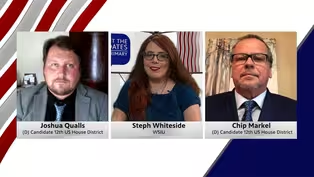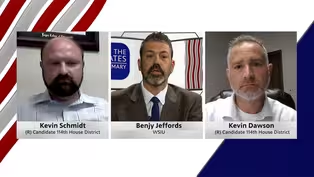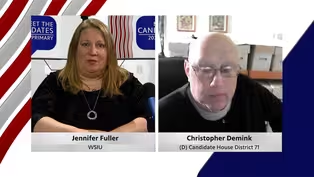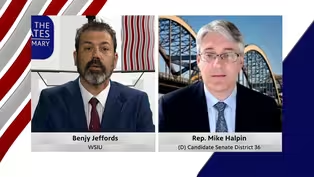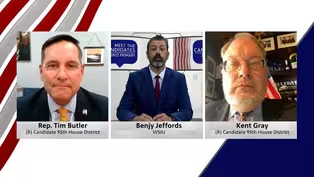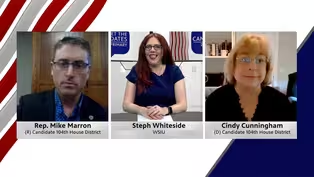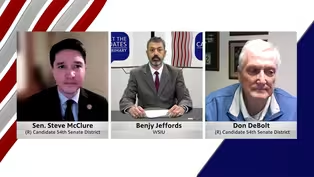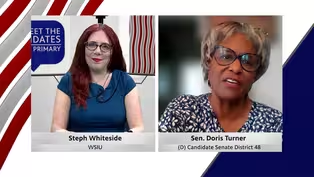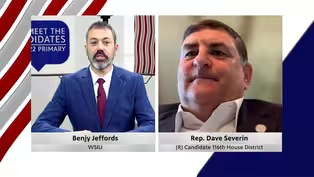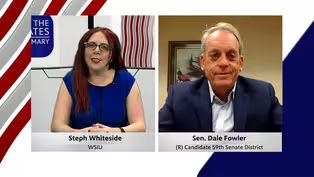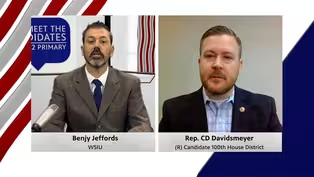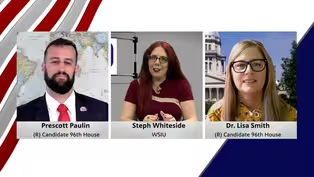Meet the Candidates
115th Illinois House District Primary Republican Candidates
5/5/2022 | 23m 14sVideo has Closed Captions
115th Illinois House District Primary Republican Candidates forum.
Meet the Candidates interviews candidate (R) Rep. David Friess for the 115th District of the Illinois House.
Problems playing video? | Closed Captioning Feedback
Problems playing video? | Closed Captioning Feedback
Meet the Candidates is a local public television program presented by WSIU
This series is produced in partnership with the League of Women Voters
Meet the Candidates
115th Illinois House District Primary Republican Candidates
5/5/2022 | 23m 14sVideo has Closed Captions
Meet the Candidates interviews candidate (R) Rep. David Friess for the 115th District of the Illinois House.
Problems playing video? | Closed Captioning Feedback
How to Watch Meet the Candidates
Meet the Candidates is available to stream on pbs.org and the free PBS App, available on iPhone, Apple TV, Android TV, Android smartphones, Amazon Fire TV, Amazon Fire Tablet, Roku, Samsung Smart TV, and Vizio.
Providing Support for PBS.org
Learn Moreabout PBS online sponsorshipMore from This Collection
Meet the Candidates features interviews with candidates running for Illinois state, House and Senate races. Guests will discuss key issues impacting Illinois voters such as the economy, the environment, education and public health. This series is produced in partnership with the League of Women Voters.
12th U.S. Congressional Seat Primary Candidate Forum
Video has Closed Captions
Joshua Qualls and Chip Markel, running for the 12th U.S. Congressional Seat. (25m 21s)
114th Illinois House District Primary Candidate Forum
Video has Closed Captions
Dr. Kevin Schmidt and Kevin Dawson, running for the 114th House District. (25m 57s)
71st House District Primary Candidate
Video has Closed Captions
Ahead of the June primary, WSIU talked with Christopher Demink, running for the 71st House (21m 35s)
36th Senate District Primary Candidate Forum
Video has Closed Captions
WSIU talked with 36th Senate District candidate Representative Mike Halpin. (26m 29s)
95th Illinois House District Primary Republican Candidates
Video has Closed Captions
Representative Tim Butler and Kent Gray, running for the 95th House District. (26m 58s)
104th Illinois House District Primary Candidates
Video has Closed Captions
104th House District candidates Representative (R) Mike Marron and (D) Cindy Cunningham. (26m 49s)
54th Illinois Senate District Primary Republican Candidates
Video has Closed Captions
54th Illinois Senate District Primary Republican Candidates forum. (25m)
48th Illinois Senate District Primary Democrat Candidates
Video has Closed Captions
48th Illinois Senate District Primary Democrat Candidates forum. (26m 46s)
116th Illinois House District Primary Republican Candidates
Video has Closed Captions
116th Illinois House District Primary Republican Candidates forum. (25m 9s)
59th Illinois Senate District Primary Republican Candidate
Video has Closed Captions
WSIU interviews Senator Dale Fowler from the 59th Senate District. (27m 29s)
100th Illinois House District Primary Republican Candidates
Video has Closed Captions
WSIU interviews candidate C.D. Davidsmeyer, running for the 100th House seat. (26m 9s)
96th Illinois House District Primary Republican Candidates
Video has Closed Captions
Candidates Prescott Paulin and Dr. Lisa Smith, running for the 96th House seat. (28m 45s)
Providing Support for PBS.org
Learn Moreabout PBS online sponsorship(gentle music) (upbeat music) - This is "Meet the Candidates" and we are here with Representative David Friess from the 115th House District.
I'm Steph Whiteside.
WSIU Public Broadcasting and the League of Women Voters are pleased to host today's forum.
Thank you so much for joining us today Representative Friess.
- Let's get stated.
- Thanks for having me.
Oh, I appreciate you having me.
Thank you.
- All right.
Thank you.
So we'll start with, what is your number one priority if elected?
I know it can be hard to narrow it down, but we're gonna ask you to try to stick to just one right now.
- Sure.
Well, I, right now, it actually goes back to when I was actually, got into this career choice.
I have two kids.
Okay and they're both in high school right now.
And at some point in time I know they'll go to college and they'll go out and get a job.
And unfortunately right now with the climate in Illinois, if they make money here in the state of Illinois, they can go, you know beyond its borders to another state and actually make the same amount of money, but have more take home pay.
So I would love to make the government more efficient you know, lower the tax burden and be a little more business friendly, cause we we've been in a process of depopulating for years and if we're going to survive, we need to turn that around.
- So what makes you an effective lawmaker that you would you know, continue to do if elected?
- Well, that is a very challenging and almost impossible question to to answer because in the minority, as you know, we have very little say in what bills one, go through the committee and then two get called on a house floor.
So, I advocated for things I believe in and I oppose those things that I don't don't agree with.
- So moving on to sort of current and recent events the pandemic has really exposed disparities in education funding.
So what would you do to make sure that schools in your district are able to meet the needs of the families and students?
- Well, I know we have advocated for changing how tax bail dollars go to certain districts.
And I've actually talked to some of the Democrats in Springfield when you have school budgets tied to property taxes and you've got a very rich affluent area they have high property taxes and they can afford that.
And then you've got a district or a school district you know, that is a little further away that is a poor district obviously, they're not gonna be funded the same way because it's property taxes.
We need to change that formula, you know because obviously if you live in a poor area, you should receive the same education that somebody does in a rich area.
That's just I think just basic common sense to me.
- The state budget is another major issue in Springfield every year.
So I wanna ask you what are three things that you would prioritize when it comes to the budget?
- First, this last budget is a good example.
So we had additional money that we got from the Feds.
We did not pay down all of our unemployment trust fund liability.
You know, we should have done that because that's going to have an effect on businesses in the area and employees to make up that difference that we're probably either gonna have to raise unemployment insurance or lower benefits.
So that's first and foremost, we gotta do that.
Next I would love to have a truly balanced budget.
You know, we have over $300 billion in a pension liability out there still, you know I know the governor has tatted this budget as being balanced but when you've got that much liability out there, we really need to address that.
And you know, I'm a firm believer in lowering taxes because I think that would spur economic growth.
You know, Pritzker has done away with or is gonna have a tax holiday on gases and groceries.
And then also on, when we return to school there's gonna be a tax holiday on certain items.
You know, obviously he's doing that to help people out well let's do that, you know, permanently, it would help out everybody, especially in this time where, you know, we are dealing with inflation that is what, at 8% now, you know, that we could, we as taxpayers and the average working person could use a tax break.
- Oh yeah.
Inflation will probably come up later in these questions I hope but now that we've had a chance to talk about your budget priorities what are three things that you would look at cutting?
- Oh gosh, great question.
I hadn't even given that much thought.
I think one of the things that I advocated for was pension reform, you know and I would consider this sort of, kind of a cut.
I think the state needs to get out of what I call the pension business.
If you go to work for a private employer, you don't have a guaranteed pension of benefit anymore.
All these companies are transitioning to a 401K style program or retirement.
And I think if the state did that and I've had conversations with people in Springfield about that, now we can't do it for everybody.
Teachers are a good example because you know they have their own system, they don't pay into social security, but I think for most state employees I think we could and should do that.
And I think that would help us out tremendously.
- So as you mentioned while the economy is recovering from the early stages of the pandemic inflation is on the rise.
What would you do to help Illinoisans who are finding that their paychecks don't stretch as far as they did I mean, even a couple months ago?
- I don't know that there's this much that we can do on the state level.
Cause I think a lot of this is fueled, you know via federal policies, but if we're gonna help people out I mean, obviously everybody pays state taxes, some real fundamental serious tax relief would help out.
Anything we could do to get money back into the pocket of, you know, average Illinois.
- Moving on to another topic.
Many people are pushing for more renewable energy especially with the rising prize of oil, at the same time parts of Illinois have fossil fuel supplies that could provide energy for many years to come.
What would you do to help ensure Illinois has a steady supply of energy but also keep it affordable for Illinoisans?
- So, you know I have a power plant in my district probably 10 miles from my house and it is slated to be shut down in 2025.
If we are going to have good economic business industrial growth, even manufacturing we've gotta have cheap, reliable energy source.
And I'm not opposed to green energy but from talking to people in the power industry it's just not there yet.
You know, the other day, the wind wasn't blowing the sun wasn't shining and the so solar and wind we're not gonna produce the energy that would be necessary to, you know, power one our homes, and two in the industry in our area.
So in my opinion I think we need to slow that transition down so we do have sustainable energy, whatever the source is.
We just received a memo this week or late last week that if you purchase energy here in Southern Illinois the average residential customer is gonna have a $500 increase in their yearly energy bill.
That's, you know, it's just that hurts.
And you talking you tack that onto a business who's gonna have probably 20 or 30,000 tacked on to their annual energy bill.
You know so what happens that gets passed down to the customer.
So we need to have good sustainable energy.
- So COVID 19 has really changed a lot of things over the past couple of years.
And one of those is the way that people look at healthcare and public health.
What would you do to make sure the state is prepared to handle future public health emergencies?
- Well, one of the things I think that we really need to do is what did not happen this last time is the governor never consulted with the state legislature?
I mean, he did a lot of things for two years by executive orders.
And I don't think that that was a way to proceed.
You know, we actually have people in the state legislator that are physicians you know, they have other businesses that may had some really substantial input on this pandemic.
So for starters, I think, you know, as an equal body, I think the governor or whoever the governor is should consult the state legislature.
- Thank you.
So another topic is gun violence that continues to be a problem for communities across the state.
What would you do to address that while also balancing with second amendment rights?
- Yeah as an advocate of the second amendment I think first and foremost, if you commit a crime with a gun, especially a violent crime, I mean I think you need to be punished.
I think there's a deterrent factor there if the punishment is severe enough.
So that would be first foremost I know there's been some criminal justice reform.
I don't believe in some of the things that have been enacted and we need to punish those individuals that commit gun crimes.
- Well, you just mentioned criminal justice reform and that is actually our next question.
Do you support changes to the system including alternative sentencing options like drug courts and what changes would you make to ensure safety while also making sure rehabilitation remains an option?
- Sure, as we mentioned prior to the interview, I am an attorney and I practice primarily in Randolph county.
So I do, you know, support changes.
It just depends on what that change is.
To give you an example, I get appointed to cases where, the DCF gets involved.
You know, I get appointed to represent either the parents or the minor child.
And inevitably what happens is you have one or both parents using illegal drugs, DCFS get involved take the child from the home.
And I would love to see serious rehabilitation efforts made.
Cause right now, here in Southern Illinois you know, if somebody gets, you know they have to go to rehab, they have to go to Granite City or to Chicago for that.
We need something here local, and we need to make really stronger effort for those people who do have addiction problems to get them into the counseling, into therapy.
And it's gotta be, you know, at a facility I would say a minimum of 30 days.
And they've gotta have some follow up because from what I've seen, if you don't have you can go through the, you know the 30 day or go to Gateway or someplace but once you get out, if you don't have follow up outpatient treatment, you're gonna relapse.
So, and I don't know what that period would be but we we've gotta have outpatient follow up.
- All right.
So recent, like the pandemic again and fighting in Ukraine have really shown how much Americans can be impacted by global politics.
So what would you do to try and minimize those disruptions on Illinoisans?
- Well, obviously that comes to energy.
You know, we were energy independence prior to the current administration.
You know, president Biden has shut down some pipelines and things of that nature and has actually discouraged the use of fossil fuels.
You know, going back to prior statements, we are not there to where we can be one hundred percent renewable or green energy however you wanna phrase it.
So if we are gonna be energy independent I think that will go a long way to obviously limit any impact of that nature.
- And what do you do to make sure the concerns of your constituents are being heard in Springfield considering how much the population density does skew toward the Northern part of the state?
- Well, I listen to my constituents, you know I see them every day I get out in the public, I see their emails, their messages, and I just I advocate for, you know, things that they've believe in.
- And speaking of constituents another concern people have is elections.
What will you do to help ensure fair elections and access to voting for all people in Illinois?
- Well, me personally, I mean, I'm a firm believer in voter ID.
I mean, you need an ID to do anything these days you know, and I don't know why that has become such a controversial issue to, I mean one of our most sacred rights is voting is to not just produce an ID.
I mean, everybody's got one.
And if you don't have one, I would be all for the state providing you you can go to the DMV and just get a state issued ID.
And as a taxpayer I'd pay for that.
I'd pull in and pick up a tab for that.
- All right.
So internet access is becoming increasingly necessary for people to work and go to school.
What would you do to make sure that rural areas can get access to the high speed internet that's needed?
- Well, I saw that in my area actually I know family members that during the pandemic, they had to go remote because of COVID and they didn't have that access at their home.
So what they would have to do is they would actually drive to town so they would be able to do their, you know their kids' homework or do whatever needed to be done school related.
I'm not opposed to doing, you know seeing what we could do to grow the infrastructure, to ensure that every square inch of of Illinois has internet access.
- You've mentioned this a little bit earlier, but to get into more detail COVID-19 has depleted the state's unemployment fund.
And what would you do to try and, you know, address this?
- Well, I mean it's gotta be paid it's gotta be paid back.
And I think that this last budget I really think that the governor missed an opportunity to pay that off in its entirety.
You know, but now going forward, since I think that we owe 1.8 billion still in that, I mean it's gotta be paid back.
You know, if we're gonna keep our unemployment benefits at the same level you know, the state is gonna have to budget more wisely and pay that back.
And unfortunately, I'm actually we're gonna have to pay interest on that in the meantime you know, until it is paid off.
- Thank you.
So Illinois has one of the, some of the highest property taxes in the country.
What would you want to do to provide relief to homeowners?
- I mean I think we need, like I said, we need to restructure things specifically how that's done I honestly don't know, but just overall, I think we, as a state we've come accustomed to the state doing everything for us.
If the state would get out of our way, I guess is a way to put it maybe do some less regulation, have less bureaucrats in Springfield that would help economic growth, economic development.
And I think in turn, we could we could see our property taxes come down.
- So social services are another area that has seen funding depleted during the pandemic.
What would you do to try and make sure all Illinoisans can get access to that help when they need it?
- I mean, it is easy to say, oh, well we should properly fund that agency.
Whatever that may be.
I think the private sector does things sometimes more economical than the public sector.
So I would not be opposed to contracting out some of those services or whatever that may be.
I think that would be one way to ensure that.
- Okay, Illinois has long had a problem with leaders being involved in ethics violations.
What's your position on ethics reform?
- Well, we have proposed some ethic reforms.
Unfortunately we got watered down what we returned a watered down bill.
I think it needs to be stronger.
And I would definitely, I've supported in the past and in the future, I will support ethics reforms.
- Illinois has had an image of not being very business friendly which I think you've kind of alluded to.
What would you do to help the state attract new businesses while also maintaining the ones that are already here?
- So I've talked to a couple businesses.
My district is a boarded of district it borders Missouri and I talked to an individual who does (indistinct) and he says, look Dave, he said, I pay my guys scale wages, but in the companies across the River Missouri they can outbid him.
They can always come in with a lower bid.
And two of the main factors is unemployment insurance and liability insurance.
So those go obviously, those are costs that he's incurred that he's gotta pass onto his customer.
Okay so those two areas, first and foremost I think that we could really make some changes to make the you know economic or business more friendly here in the state.
You know, I know another trucking company.
I see his trucks on the road everywhere here in Southern Illinois, he's based out of Indiana.
And the reason being is because the unemployment insurance is so much cheaper there.
So, you know, unemployment and, you know workers comp and liability insurance, just be some huge issues that we could address.
- So you mentioned that you're involved with cases involving DCFS and parents.
I know that this is there has been issues with a consent decree that's in place.
What would you do to kind of reform the way things are handled?
- Oh, gosh.
I know I'm glad.
- It's a big one I know.
- Oh, it is huge and I don't know that I can give you anything really specific but I can tell you this myself and several other legislatures, even on the Democrat side have taken a serious look at this.
And one of the representative joked this is gonna be our summer homework assignment to go through DCFS rules and regulations and come up with some serious us reforms for that agency because it's broken.
It really is.
- Well, thank you so much for joining us today.
We really appreciate you taking the time out of your day to talk with us.
- Well, I appreciate you having me.
Thank you very much.
- Well, and thank all of you for joining us for "Meet the Candidates."
This has been Representative David Friess for the House District 115 and we'll be back next Thursday at 7:00 p.m. so tune in for more.
For WSIU I'm Steph Whiteside.

- News and Public Affairs

Top journalists deliver compelling original analysis of the hour's headlines.

- News and Public Affairs

FRONTLINE is investigative journalism that questions, explains and changes our world.












Support for PBS provided by:
Meet the Candidates is a local public television program presented by WSIU
This series is produced in partnership with the League of Women Voters

